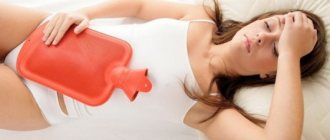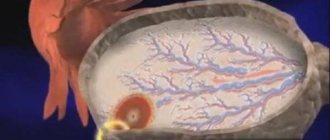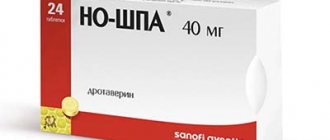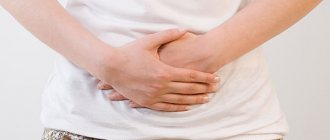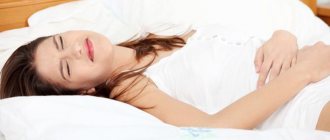Menstruation is a normal physiological process that is accompanied by unpleasant symptoms. If it hurts to go to the toilet during menstruation, you should seek help from a doctor. Often the symptom is explained by pathological causes and requires treatment. It is important to pay attention to the nature of the pain and its location. The symptom may indicate sexually transmitted diseases or disorders of the genitourinary system. Only a doctor can choose treatment. Self-medication is strictly contraindicated. Also, the symptom can lead to the formation of a number of complications, some of which are dangerous to health.
Sometimes during menstruation girls complain of pain when urinating
What is constipation?
Many people experience constipation, which causes pain when a person tries to go to the toilet.
Painful sensations contribute to the formation of cracks through which bacteria and infection can very easily penetrate.
Disruption of the gastrointestinal tract is the reason why constipation occurs, the duration of which may vary.
A violation is stool retention for 4-5 days.
Constipation is a period of difficulty in defecation that occurs in people for some reason. This only indicates an imbalance in nutrition, as well as the formation of problems in the gastrointestinal tract.
Why does it hurt to go to the toilet?
In fact, pain during bowel movements may indicate the presence of various types of diseases. You should not ignore such signs from the body. It is quite possible that the pain appears for a reason and a more thorough and in-depth diagnosis is needed within the walls of a medical institution.
Main factors:
- Firstly, it should be noted that the most common cause is disruption of the gastrointestinal tract. This happens when the diet is disrupted and the food consumed is not balanced. Diseases associated with the functioning of the gastrointestinal tract may also be the cause. This requires in-depth diagnostics.
- Secondly, constipation is an equally common phenomenon that occurs in people of any age category. With constipation, fecal stones directly scratch the intestinal walls, moving forward. This is what causes pain in the process.
- Thirdly, recent childbirth may be the cause of pain . Of course, the problem is inherent to women. Childbirth, recently experienced by a woman, causes a number of disturbances not only in the functioning of some organs, but also problems with stool. As you know, during childbirth, a woman not only experiences pain, but also puts a huge strain on almost all organs.
- Often the cause is hidden in a woman's venous system . The connection lies in the fact that during the period of bearing a baby, as well as during childbirth, blood stagnation forms in the venous system. The fetus carried by a woman compresses the blood vessels and primarily has a physical effect on the venous system. As a result, not only the gastrointestinal tract, but also the entire venous system receives compression. As you can see, everything in a woman’s body is interconnected during the period of gestation.
What is prevention?
Pain during menstruation can be prevented by following a number of preventive measures. Doctors recommend:
- observe basic personal hygiene;
- use condoms during casual sexual intercourse or when having sex with a sexual partner you are not sure about;
- avoid possible hypothermia;
- refuse rough forms of sexual contacts;
- eliminate any inflammatory processes in a timely manner;
- eat right and exercise;
- to refuse from bad habits.
It is required to regularly visit a gynecologist for prevention. Any disease needs timely elimination. Independent selection of medications is strictly contraindicated.
Symptoms of rectal diseases
Rectal disease is perhaps the most common among both women and men. It should be noted that this disease is inherent in any age category.
The formation of such a disease cannot even be controlled. What is rectal disease and how to recognize it among all similar diseases?
There are quite a lot of symptoms and everyone has encountered one of them:
Abdominal pain.
This has happened to any person. Pain of this nature spreads primarily to the anal canal. The pain can be either sharp or aching. A significant reduction in pain occurs during the release of gases.- Abnormal stool. Constipation contributes, first of all, to intoxication of the body, which, of course, has a negative impact on the health of any person.
- Rumbling. Many have encountered such incomprehensible symptoms as rumbling in the stomach and 50% do not even attach any importance to it. It is these sounds that indicate that gas formation is increasing.
- Bursting pain in the intestinal area . Pain, as a rule, varies in intensity. However, based on the occurrence of pain in a certain period of time, diseases are determined.
As you can see, the symptoms are quite banal and familiar to everyone. Any of the symptoms may indicate the presence of a serious illness. If any violations are detected, you must carefully monitor your body and, if necessary, consult a competent doctor.
How is the treatment carried out?
Treatment measures are selected based on the diagnosis. It is recommended to take painkillers. However, the medicine is aimed at eliminating the main symptom. It is impossible to get rid of the root cause in this way. Comprehensive therapy is important.
The use of antibacterial drugs may be required.
In this way, the causative agent of the disease is eliminated. The drug can be prescribed in the form of injections, tablets and suppositories. Additionally, it is recommended to take vitamin complexes. Thanks to this, the body's protective functions are increased. Read more: about the effect of vitamins on the normalization of the menstrual cycle.
This video talks about the causes of a wide variety of pain that occurs during menstruation:
Causes
What is the reason for pain during bowel movements? There really are enough reasons. It is necessary to sort it out in order.
Constipation
Constipation is known to be the most common phenomenon that even small children face. Of course, the cause of constipation is primarily a disruption of the gastrointestinal tract.
When intestinal function is disrupted, fecal stones contribute to damage to the intestinal walls as they move forward. This contributes to the formation of constipation and causes pain during bowel movements.
How to deal with this? It is necessary to first restore the nutritional balance and review the foods consumed. It is quite possible that a lot of “heavy” foods are included in one meal, the consumption of which causes constipation.
Gastrointestinal tract dysfunction
Often, for reasons that are not even clear, people’s gastrointestinal tract is disrupted. This can also be explained by reduced immunity and, for example, consumption of an excess amount of food that was not consumed previously.
What then? As a rule, the lack of a balanced diet entails disruption of the gastrointestinal tract and this is accompanied not only by intestinal problems, but also by a number of other unpleasant symptoms.
Haemorrhoids
This problem, as a rule, is often faced by women during the postpartum period. Usually, during the period of gestation, physical compression occurs not only of all organs, but also of the venous system, affecting the intestines.
In this case, blood stagnation occurs, due to which hemorrhoids form. When pushing, the nodes swell and can burst. This leads not only to bleeding, but also unbearable pain.
Dilatation of hemorrhoidal veins
Women after childbirth often become victims of such a diagnosis as dilated veins of the hemorrhoid type. The thing is that the child, while still in his mother’s belly, is actively growing and developing.
This process contributes to physical pressure on many organs, one of which is the intestines. The reasons don't end there. It turns out that the child also has a physical effect on the woman’s venous system.
Blood stagnation is the most common phenomenon and, alas, there is no escape from it. Due to the process of stagnation, the veins begin to swell, which subsequently, as mentioned earlier, leads not only to rupture, but also to pain.
The expansion of the veins is carried out under the pressure of stagnant blood. This is the main reason why veins dilate.
Neoplasms
Polyps are benign neoplasms. Removing formations is accessible and possibly using the safest methods. Such neoplasms can cause constipation and various intestinal-related diseases.
Cracks
Many women are familiar with such a problem as cracks. As a rule, cracks form in and near the anus. This happens from strong attempts, as a result of which the skin cannot withstand it, and microcracks are formed that can grow into larger ones. When you have a bowel movement, the cracks cause pain and discomfort.
In another way, this phenomenon is called anal fissure. This is a rupture of the mucous membrane near the anus.
Often the cause of the formation of cracks is mechanical damage due to the rectum. When stool is upset, such micro cracks also form.
Symptoms of this phenomenon are burning pain, as well as the formation of blood in the anus, spasms in the anal area. Cracks are rarely treated because they heal on their own.
Long-term constipation can aggravate the situation and increase the size of the cracks. As a rule, the formation of such cracks leads to pain and itching in the anal area.
Possible complications
Painful urination, which is a consequence of infection in the urethra from the vagina, can lead to numerous complications. Even after the symptoms completely subside, the pathology in the body continues to develop. The consequence of untreated cystitis can be the progression of its interstitial forms, affecting not only the mucous, but also the deep muscular layer of the bladder. It is completely impossible to cure this disease: the destructive process in the initial stages is manifested by severe discomfort, which subsides and intensifies from time to time. Complicated cystitis with careless or inadequate treatment in severe cases can lead to hemorrhagic or gangrenous changes in the bladder tissue and loss of its functions. The development of paracystitis threatens extensive inflammation of the pelvic tissue, peritonitis.
Ascending infection with gonorrhea, ureaplasma, and other microbiological lesions causes cycle disruption, general signs of infection of the genital organs and subsequent salpingoopharitis (adnexitis), disruption of the structure of the ovaries. The consequences are adhesions of the pelvic organs, ectopic pregnancies, and infertility.
Inflammation of hemorrhoids during menstruation can lead to massive blood loss, anemia, the development of rectal fissures, and thrombus formation.
Foreign bodies in the rectum
Foreign body in the rectum - the presence of a foreign object in the area of the distal part of the large intestine.
Symptoms of the presence of a foreign body are, first of all, pain and a constant urge to stool, and minor bleeding is also possible.
For diagnosis, a digital examination method is used to assess the presence of a foreign body in the rectum.
This disease is often characteristic of persons suffering from alcoholism. The risk group includes people with non-standard views on sexuality.
As such, a foreign body concentrated in the rectum does not pose a threat. It is necessary to efficiently remove the foreign body from the rectum.
If a foreign body remains in the rectum for a long time, this may lead to the development of an infectious disease.
It is painful to go to the toilet during menstruation
The period of menstruation is a rather important period for the woman herself.
During this period, women are not only aggressive, but also often feel unwell and are sometimes completely unable to do anything.
Lack of performance, pain in the lower abdomen, dizziness and other symptoms - all this is accompanied simultaneously during one period - during menstruation.
As a rule, the most common problem is hemorrhoids, the development of which, as is known, begins in the postpartum period. This happens due to the fact that during the period of gestation, a woman experiences venous stagnation of blood.
This is facilitated by the baby, which is carried by a woman for nine months and whose growth in the mother’s tummy increases more and more.
The formation of hemorrhoids, which subsequently swell and can burst, is the cause of pain when stool.
Of course, the problem may also be related to eating disorders. Women often neglect their diet and then start eating again as before, which only worsens their health and doubles their excess weight.
Normal menstrual cycle
In fact, no matter what mothers and grandmothers, who also suffered from this scourge, say, pain during menstruation is by no means the norm. Normal menstruation is painless. Of course, you may feel a little discomfort due to spasms - but just a small one that does not interfere with everyday activities, and not severe pain that makes it impossible to lead a normal lifestyle.
How does a normal menstrual cycle work? The duration of the menstrual cycle is counted from the first day of menstruation until the beginning of the next. The first half of the cycle is called the follicular phase. At this time, a special formation grows in the ovary - a follicle, inside which the egg matures. These two weeks, hormones called “estrogens” predominate in the female body. They not only stimulate the proliferation of cells in the mucous membrane of the uterus and vagina, but also affect the entire woman’s body:
- improve bone mineralization;
- enhance collagen synthesis in the skin;
- improve memory, attention, thinking;
- reduce sebum production;
- normalize blood lipid composition.
This is the time when a healthy woman feels cheerful, energetic and productive.
About 14 days after the first day of menstruation, the follicle ruptures and an egg is released. This process is called ovulation. The hatched egg travels through the fallopian tube, and in the place of the former follicle a corpus luteum is formed. The next two weeks of the cycle are called the luteal phase. The corpus luteum produces progesterone, a hormone that prepares the body for pregnancy. Under its action, the mucous membrane of the uterus becomes thicker, preparing to receive a fertilized egg, the muscles of the uterus relax, and body temperature slightly rises. In addition, progesterone removes excess fluid from the body and increases appetite.
If a fertilized egg is implanted in the uterus, the corpus luteum remains until the placenta develops, which takes over the function of producing hormones to maintain pregnancy. If pregnancy does not occur, the corpus luteum gradually dies and atrophies. The concentration of female hormones in the blood drops sharply, the vessels of the uterine mucosa spasm, and the mucous membrane, deprived of nutrition, also dies and is excreted from the body during menstruation. A new cycle begins.
Normally, the duration of the cycle is from 21 to 35 days, the main thing is that it is regular, that is, an equal amount of time passes between periods. A cycle of 28 days is considered ideal.
If the hormonal balance is normal, a woman’s body works, as they say, like a clock, she does not experience any discomfort either before or during menstruation. But if the hormonal balance is disturbed, dysmenorrhea can develop - pain during menstruation. Moreover, often the reason is not some serious pathological processes within the body, but a banal lack of vitamins - after all, vitamins are involved in the regulation of all metabolic processes within our body, including the production and activation of hormones.
Dysmenorrhea - painful periods: causes and manifestations
Dysmenorrhea, or painful periods, can be primary or secondary. A process caused by some disease is called secondary. Therefore, if the nature of menstruation suddenly changes: they become more abundant or, on the contrary, very scanty, and previously painless periods begin to cause discomfort, you need to consult a doctor.
Primary dysmenorrhea is a condition when a woman is formally absolutely healthy, but pain during menstruation persists. Often the pain is accompanied by other symptoms, which, to put it mildly, complicate life. They can be divided into the following groups:
- Emotional and mental - irritability, low mood up to depression, drowsiness or, conversely, insomnia, complete loss of appetite or uncontrollable “eating”, increased sensitivity to odors. All this is the result of changes in the nervous system that accompany menstrual pain.
- Autonomic symptoms are caused by dysregulation of the autonomic nervous system, which controls the functioning of blood vessels and internal organs. These are symptoms such as headache, chills or feeling hot, nausea, dizziness, cold hands and feet, hiccups, dry mouth, bloating, and frequent urination.
- Metabolic-endocrine symptoms are manifestations of hormone imbalance in the body: skin itching, swelling, weakness, vomiting, pain in joints and muscles.
Pain when going to the toilet during pregnancy
Pregnancy is a period no less important in a woman’s life. As you know, during the period of bearing a baby, wives are faced with a number of problems that cause discomfort and poor health directly for expectant mothers.
As a rule, during this period the same problem develops as in the postpartum period - the development of hemorrhoids.
Unfortunately, not everyone succeeds in protecting the venous system from pressure from the baby, and few are lucky.
In this case, venous congestion occurs, leading to the formation of hemorrhoidal nodes. These nodes cause discomfort both to the expectant mother and to the woman who has already given birth.
When pushing, these nodes can inflate and then burst. All this leads not only to bleeding, but also to the fact that it is very painful for the baby’s mother to go to the toilet.


